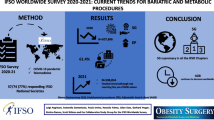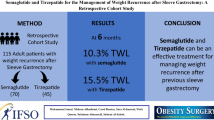Abstract
Purpose
This study reviews the prevalence of iron deficiency (ID) in bariatric surgery candidates and the long-term outcomes of the prevalence of ID after bariatric surgery.
Materials and Methods
A systematic literature search and meta-analysis were performed in PubMed for articles published by August 31, 2022, including these search terms: bariatric surgery, metabolic surgery, weight loss surgery, obesity surgery, sleeve gastrectomy, gastric banding, gastric bypass, duodenal switch, duodenojejunal bypass, iron, iron deficiency, sideropenia, and hypoferritinemia. Fifty-seven studies examining a total of 26,328 patients with morbidly obese were included in this meta-analysis finally.
Results
The results showed a prevalence of 17% of ID in bariatric surgery candidates and a prevalence of 14%, 17%, 26%, 34%, 23%, 38%, and 23% of ID at 1-, 2-, 3-, 4-, 5-, 8-, and 10-year follow-up after bariatric surgery, respectively. Additionally, the results showed a prevalence of 15%, 19%, 35%, 38%, 29%, 30%, and 23% of ID at 1-, 2-, 3-, 4-, 5-, 8-, and 10-year follow-up after Roux-en-Y gastric bypass, respectively; a prevalence of 12%, 12%, 15%, 31%, and 17% of ID at 1-, 2-, 3-, 4-, and 5-year follow-up after sleeve gastrectomy, respectively; and a prevalence of 19% of ID at 1-year follow-up after anastomosis gastric bypass.
Conclusion
As a result, preoperative evaluation and correction of ID may lead to better outcomes for bariatric surgery candidates. ID is also common in patients after bariatric procedures, especially RYGB. Long-term, even lifelong, medical and nutritional monitoring and tailored interventions are critical.
Graphical Abstract











Similar content being viewed by others
Abbreviations
- BMI:
-
Body mass index
- BPD/DS:
-
Biliopancreatic diversion with duodenal switch
- Hep:
-
Hepcidin
- ID:
-
Iron deficiency
- OAGB:
-
One anastomosis gastric bypass
- RYGB:
-
Roux-en-Y gastric bypass
- SG:
-
Sleeve gastrectomy
- GB:
-
Gastric banding
References
Kontis V, Mathers CD, Bonita R, et al. Regional contributions of six preventable risk factors to achieving the 25 × 25 non-communicable disease mortality reduction target: a modelling study. Lancet Glob Health. 2015;3(12):e746–57.
Aminian A, Wilson R, Al-Kurd A, et al. Association of bariatric surgery with cancer risk and mortality in adults with obesity. JAMA. 2022;327(24):2423–33.
Asghari G, Khalaj A, Ghadimi M, et al. Prevalence of micronutrient deficiencies prior to bariatric surgery: Tehran Obesity Treatment Study (TOTS). Obes Surg. 2018;28(8):2465–72.
Antoniewicz A, Kalinowski P, Kotulecka KJ, et al. Nutritional deficiencies in patients after Roux-en-Y gastric bypass and sleeve gastrectomy during 12-month follow-up. Obes Surg. 2019;29(10):3277–84.
Ferraz ÁAB, Carvalho MRC, Siqueira LT, et al. Micronutrient deficiencies following bariatric surgery: a comparative analysis between sleeve gastrectomy and Roux-en-Y gastric bypass. Rev Col Bras Cir. 2018;45(6):e2016.
Krzizek EC, Brix JM, Herz CT, et al. Prevalence of micronutrient deficiency in patients with morbid obesity before bariatric surgery. Obes Surg. 2018;28(3):643–8.
Benotti PN, Wood GC, Dove JT, et al. Iron deficiency is highly prevalent among candidates for metabolic surgery and may affect perioperative outcomes. Surg Obes Relat Dis. 2021;17(10):1692–9.
Stroup DF, Berlin JA, Morton SC, et al. Meta-analysis of observational studies in epidemiology: a proposal for reporting. Meta-analysis Of Observational Studies in Epidemiology (MOOSE) group. JAMA. 2000;283(15):2008–12.
Moher D, Shamseer L, Clarke M, et al. Preferred reporting items for systematic review and meta-analysis protocols (PRISMA-P) 2015 statement. Syst Rev. 2015;4(1):1.
Stang A. Critical evaluation of the Newcastle-Ottawa scale for the assessment of the quality of nonrandomized studies in meta-analyses. Eur J Epidemiol. 2010;25(9):603–5.
Salgado Jr W, Modotti C, Nonino CB, et al. Anemia and iron deficiency before and after bariatric surgery. Surg Obes Relat Dis. 2014;10(1):49–54.
Al-Mutawa A, Al-Sabah S, Anderson AK, et al. Evaluation of nutritional status post laparoscopic sleeve gastrectomy-5-year outcomes. Obes Surg. 2018;28(6):1473–83.
Hegarty C, Breen C, Fearon NM, et al. Assessment of baseline rates of functional and absolute iron deficiency in bariatric surgery candidates: a retrospective study. Surg Obes Relat Dis. 2021;17(12):2009–14.
Antoine D, Li Z, Quilliot D, et al. Medium term post-bariatric surgery deficit of vitamin B12 is predicted by deficit at time of surgery. Clin Nutr. 2021;40(1):87–93.
Lowry B, Hardy K, Vergis A. Iron deficiency in bariatric surgery patients: a single-centre experience over 5 years. Can J Surg. 2020;63(4):E365–e9.
Lombardo M, Franchi A, Biolcati Rinaldi R, et al. Long-term iron and vitamin B12 deficiency are present after bariatric surgery, despite the widespread use of supplements. Int J Environ Res Public Health. 2021;18(9)
Sandvik J, Bjerkan KK, Græslie H, et al. Iron deficiency and anemia 10 years after Roux-en-Y gastric bypass for severe obesity. Front Endocrinol (Lausanne). 2021;12:679066.
Ben-Porat T, Weiss R, Sherf-Dagan S, et al. Nutritional deficiencies in patients with severe obesity before bariatric surgery: what should be the focus during the preoperative assessment? J Acad Nutr Diet. 2020;120(5):874–84.
Dong L, Suh H, Karantanis W, et al. Evaluation of micronutrient status post laparoscopic sleeve gastrectomy: an Australian Perspective. Obes Surg. 2021;31(3):1099–104.
Lee PC, Ganguly S, Dixon JB, et al. Nutritional deficiencies in severe obesity: a multiethnic Asian cohort. Obes Surg. 2019;29(1):166–71.
Shipton MJ, Johal NJ, Dutta N, et al. Haemoglobin and hematinic status before and after bariatric surgery over 4 years of follow-up. Obes Surg. 2021;31(2):682–93.
Souza NMM, Santos ACO, Santa-Cruz F, et al. Nutritional impact of bariatric surgery: a comparative study of Roux-en-Y gastric bypass and sleeve gastrectomy between patients from the public and private health systems. Rev Col Bras Cir. 2020;47:e20202404.
Careaga M, Moizé V, Flores L, et al. Inflammation and iron status in bariatric surgery candidates. Surg Obes Relat Dis. 2015;11(4):906–11.
Komaei I, Sarra F, Lazzara C, et al. One anastomosis gastric bypass-mini gastric bypass with tailored biliopancreatic limb length formula relative to small bowel length: preliminary results. Obes Surg. 2019;29(9):3062–70.
van de Laar A, Gerdes VEA, Huijgen R, et al. Interpretation of laboratory results after gastric bypass surgery: the effects of weight loss and time on 30 blood tests in a 5-year follow-up program. Surg Obes Relat Dis. 2021;17(2):319–28.
Wang C, Guan B, Yang W, et al. Prevalence of electrolyte and nutritional deficiencies in Chinese bariatric surgery candidates. Surg Obes Relat Dis. 2016;12(3):629–34.
Sandvik J, Hole T, Klöckner CA, et al. Intravenous iron treatment in the prevention of iron deficiency and anaemia after Roux-en-Y gastric bypass. Obes Surg. 2020;30(5):1745–52.
Kunst I, Krebs M, Dreschl B, et al. Iron deficiency - not only a premenopausal topic after bariatric surgery? Obes Surg. 2021;31(7):3242–50.
Monaco-Ferreira DV, Leandro-Merhi VA. Status of iron metabolism 10 years after Roux-En-Y gastric bypass. Obes Surg. 2017;27(8):1993–9.
Monteiro AM, Fernandes V, Matta-Coelho C, et al. Iron deficiency and obesity - are we diagnosing with appropriate indicators? Acta Med Port. 2018;31(9):478–82.
Khanbhai M, Dubb S, Patel K, et al. The prevalence of iron deficiency anaemia in patients undergoing bariatric surgery. Obes Res Clin Pract. 2015;9(1):45–9.
Gowanlock Z, Lezhanska A, Conroy M, et al. Iron deficiency following bariatric surgery: a retrospective cohort study. Blood Adv. 2020;4(15):3639–47.
Arias PM, Domeniconi EA, García M, et al. Micronutrient deficiencies after Roux-en-Y gastric bypass: long-term results. Obes Surg. 2020;30(1):169–73.
Nergaard BJ, Leifsson BG, Hedenbro J, et al. Gastric bypass with long alimentary limb or long pancreato-biliary limb--long-term results on weight loss, resolution of co-morbidities and metabolic parameters. Obes Surg. 2014;24(10):1595–602.
Kessler Y, Adelson D, Mardy-Tilbor L, et al. Nutritional status following one anastomosis gastric bypass. Clin Nutr. 2020;39(2):599–605.
Al-Mutawa A, Anderson AK, Alsabah S, et al. Nutritional status of bariatric surgery candidates. Nutrients. 2018;10(1)
Pellegrini M, Rahimi F, Boschetti S, et al. Pre-operative micronutrient deficiencies in patients with severe obesity candidates for bariatric surgery. J Endocrinol Invest. 2021;44(7):1413–23.
Ben-Porat T, Elazary R, Goldenshluger A, et al. Nutritional deficiencies four years after laparoscopic sleeve gastrectomy-are supplements required for a lifetime? Surg Obes Relat Dis. 2017;13(7):1138–44.
Tan BC, Park YS, Won Y, et al. Preoperative nutritional deficiencies in bariatric surgery candidates in Korea. Obes Surg. 2021;31(6):2660–8.
Dalcanale L, Oliveira CP, Faintuch J, et al. Long-term nutritional outcome after gastric bypass. Obes Surg. 2010;20(2):181–7.
Flancbaum L, Belsley S, Drake V, et al. Preoperative nutritional status of patients undergoing Roux-en-Y gastric bypass for morbid obesity. J Gastrointest Surg. 2006;10(7):1033–7.
Aarts EO, Janssen IM, Berends FJ. The gastric sleeve: losing weight as fast as micronutrients? Obes Surg. 2011;21(2):207–11.
Sherf Dagan S, Keidar A, Raziel A, et al. Do bariatric patients follow dietary and lifestyle recommendations during the first postoperative year? Obes Surg. 2017;27(9):2258–71.
Mulita F, Lampropoulos C, Kehagias D, et al. Long-term nutritional deficiencies following sleeve gastrectomy: a 6-year single-centre retrospective study. Prz Menopauzalny. 2021;20(4):170–6.
Del Villar ME, Neme-Yunes Y, Clavellina-Gaytan D, et al. Anemia after Roux-en-Y gastric bypass. How feasible to eliminate the risk by proper supplementation? Obes Surg. 2015;25(1):80–4.
Jain M, Tantia O, Goyal G, et al. Tailored one anastomosis gastric bypass - subgroup analysis of a randomised control trial based on bilio-pancreatic limb length with long-term results of 101 patients. J Minim Access Surg. 2022;18(2):264–72.
Strain GW, Torghabeh MH, Gagner M, et al. Nutrient status 9 years after biliopancreatic diversion with duodenal switch (BPD/DS): an observational study. Obes Surg. 2017;27(7):1709–18.
Vargas-Ruiz AG, Hernández-Rivera G, Herrera MF. Prevalence of iron, folate, and vitamin B12 deficiency anemia after laparoscopic Roux-en-Y gastric bypass. Obes Surg. 2008;18(3):288–93.
Toh SY, Zarshenas N, Jorgensen J. Prevalence of nutrient deficiencies in bariatric patients. Nutrition. 2009;25(11-12):1150–6.
Lefebvre P, Letois F, Sultan A, et al. Nutrient deficiencies in patients with obesity considering bariatric surgery: a cross-sectional study. Surg Obes Relat Dis. 2014;10(3):540–6.
Hakeam HA, O'Regan PJ, Salem AM, et al. Impact of laparoscopic sleeve gastrectomy on iron indices: 1 year follow-up. Obes Surg. 2009;19(11):1491–6.
Madan AK, Orth WS, Tichansky DS, et al. Vitamin and trace mineral levels after laparoscopic gastric bypass. Obes Surg. 2006;16(5):603–6.
Zarshenas N, Nacher M, Loi KW, et al. Investigating nutritional deficiencies in a group of patients 3 years post laparoscopic sleeve gastrectomy. Obes Surg. 2016;26(12):2936–43.
Darabi S, Talebpour M, Zeinoddini A, et al. Laparoscopic gastric plication versus mini-gastric bypass surgery in the treatment of morbid obesity: a randomized clinical trial. Surg Obes Relat Dis. 2013;9(6):914–9.
Mercachita T, Santos Z, Limão J, et al. Anthropometric evaluation and micronutrients intake in patients submitted to laparoscopic Roux-en-Y gastric bypass with a postoperative period of ≥ 1 year. Obes Surg. 2014;24(1):102–8.
Damms-Machado A, Friedrich A, Kramer KM, et al. Pre- and postoperative nutritional deficiencies in obese patients undergoing laparoscopic sleeve gastrectomy. Obes Surg. 2012;22(6):881–9.
Dogan K, Aarts EO, Koehestanie P, et al. Optimization of vitamin suppletion after Roux-en-Y gastric bypass surgery can lower postoperative deficiencies: a randomized controlled trial. Medicine (Baltimore). 2014;93(25):e169.
Obinwanne KM, Fredrickson KA, Mathiason MA, et al. Incidence, treatment, and outcomes of iron deficiency after laparoscopic Roux-en-Y gastric bypass: a 10-year analysis. J Am Coll Surg. 2014;218(2):246–52.
Ledoux S, Calabrese D, Bogard C, et al. Long-term evolution of nutritional deficiencies after gastric bypass: an assessment according to compliance to medical care. Ann Surg. 2014;259(6):1104–10.
Engebretsen KV, Blom-Høgestøl IK, Hewitt S, et al. Anemia following Roux-en-Y gastric bypass for morbid obesity; a 5-year follow-up study. Scand J Gastroenterol. 2018;53(8):917–22.
Silva RA, Malta FM, Correia MF, et al. Serum vitamin B12, iron and folic acid deficiencies in obese individuals submitted to different bariatric techniques. Arq Bras Cir Dig. 2016;29(Suppl 1):62–6.
Aarts EO, van Wageningen B, Janssen IM, et al. Prevalence of anemia and related deficiencies in the first year following laparoscopic gastric bypass for morbid obesity. J Obes. 2012;2012:193705.
Pizza F, Lucido FS, D'Antonio D, et al. Biliopancreatic limb length in one anastomosis gastric bypass: which is the best? Obes Surg. 2020;30(10):3685–94.
Nairz M, Weiss G. Iron in infection and immunity. Mol Aspects Med. 2020;75:100864.
González-Domínguez Á, Visiedo-García FM, Domínguez-Riscart J, et al. Iron metabolism in obesity and metabolic syndrome. Int J Mol Sci. 2020;21(15)
Yueying C, Yu Fan W, Jun S. Anemia and iron deficiency in Crohn’s disease. Expert Rev Gastroenterol Hepatol. 2020;14(3):155–62.
Sonnweber T, Ress C, Nairz M, et al. High-fat diet causes iron deficiency via hepcidin-independent reduction of duodenal iron absorption. J Nutr Biochem. 2012;23(12):1600–8.
Sanad M, Osman M, Gharib A. Obesity modulate serum hepcidin and treatment outcome of iron deficiency anemia in children: a case control study. Ital J Pediatr. 2011;37:34.
Mujica-Coopman MF, Brito A, López de Romaña D, et al. Body mass index, iron absorption and iron status in childbearing age women. J Trace Elem Med Biol. 2015;30:215–9.
Flynn AC, Begum S, White SL, et al. Relationships between maternal obesity and maternal and neonatal iron status. Nutrients. 2018;10(8)
Zimmermann MB, Zeder C, Muthayya S, et al. Adiposity in women and children from transition countries predicts decreased iron absorption, iron deficiency and a reduced response to iron fortification. Int J Obes (Lond). 2008;32(7):1098–104.
Bjørklund G, Peana M, Pivina L, et al. Iron deficiency in obesity and after bariatric surgery. Biomolecules. 2021;11(5)
Kanamori Y, Murakami M, Sugiyama M, et al. Hepcidin and IL-1β. Vitam Horm. 2019;110:143–56.
McClung JP, Karl JP. Iron deficiency and obesity: the contribution of inflammation and diminished iron absorption. Nutr Rev. 2009;67(2):100–4.
Rogero MM, Calder PC. Obesity, inflammation, toll-like receptor 4 and fatty acids. Nutrients. 2018;10(4)
Ellulu MS, Patimah I, Khaza’ai H, Rahmat A, Abed Y. Obesity and inflammation: the linking mechanism and the complications. J Arch Med Sci: AMS. 2017;13(4):851–63.
Amato A, Santoro N, Calabrò P, et al. Effect of body mass index reduction on serum hepcidin levels and iron status in obese children. Int J Obes (Lond). 2010;34(12):1772–4.
Gong L, Yuan F, Teng J, et al. Weight loss, inflammatory markers, and improvements of iron status in overweight and obese children. J Pediatr. 2014;164(4):795–800.e2.
Arterburn DE, Telem DA, Kushner RF, et al. Benefits and risks of bariatric surgery in adults: a review. JAMA. 2020;324(9):879–87.
Kwon Y, Ha J, Lee YH, et al. Comparative risk of anemia and related micronutrient deficiencies after Roux-en-Y gastric bypass and sleeve gastrectomy in patients with obesity: an updated meta-analysis of randomized controlled trials. Obes Rev. 2022;23(4):e13419.
Welbourn R, Hollyman M, Kinsman R, et al. Bariatric surgery worldwide: baseline demographic description and one-year outcomes from the fourth IFSO Global Registry Report 2018. Obes Surg. 2019;29(3):782–95.
Gu L, Fu R, Chen P, et al. In terms of nutrition, the most suitable method for bariatric surgery: laparoscopic sleeve gastrectomy or Roux-en-Y gastric bypass? A systematic review and Meta-analysis. Obes Surg. 2020;30(5):2003–14.
Enani G, Bilgic E, Lebedeva E, et al. The incidence of iron deficiency anemia post-Roux-en-Y gastric bypass and sleeve gastrectomy: a systematic review. Surg Endosc. 2020;34(7):3002–10.
Cepeda-Lopez AC, Allende-Labastida J, Melse-Boonstra A, et al. The effects of fat loss after bariatric surgery on inflammation, serum hepcidin, and iron absorption: a prospective 6-mo iron stable isotope study. Am J Clin Nutr. 2016;104(4):1030–8.
O'Kane M, Parretti HM, Pinkney J, et al. British Obesity and Metabolic Surgery Society Guidelines on perioperative and postoperative biochemical monitoring and micronutrient replacement for patients undergoing bariatric surgery-2020 update. Obes Rev. 2020;21(11):e13087.
Mechanick JI, Apovian C, Brethauer S, et al. Clinical practice guidelines for the perioperative nutrition, metabolic, and nonsurgical support of patients undergoing bariatric procedures - 2019 update: cosponsored by American Association of Clinical Endocrinologists/American College of Endocrinology, The Obesity Society, American Society for Metabolic and Bariatric Surgery, Obesity Medicine Association, and American Society of Anesthesiologists. Obesity (Silver Spring). 2020;28(4):O1–o58.
Heber D, Greenway FL, Kaplan LM, et al. Endocrine and nutritional management of the post-bariatric surgery patient: an Endocrine Society Clinical Practice Guideline. J Clin Endocrinol Metab. 2010;95(11):4823–43.
DeFilipp Z, Lister J, Gagné D, et al. Intravenous iron replacement for persistent iron deficiency anemia after Roux-en-Y gastric bypass. Surg Obes Relat Dis. 2013;9(1):129–32.
Author information
Authors and Affiliations
Corresponding author
Ethics declarations
Ethical Approval Statement
For this type of study formal consent is not required.
Informed Consent Statement
Informed consent does not apply.
Conflict of Interest
The authors declare no competing interests.
Additional information
Publisher’s Note
Springer Nature remains neutral with regard to jurisdictional claims in published maps and institutional affiliations.
Key Points
1. Iron deficiency is common in bariatric surgery candidates; preoperative evaluation and correction of iron deficiency may lead to better outcomes for patients.
2. Iron deficiency may be found after any type of bariatric surgery, especially RYGB.
3. Long-term, even lifelong, medical and nutritional monitoring and tailored interventions are critical for patients after bariatric surgery.
Rights and permissions
Springer Nature or its licensor (e.g. a society or other partner) holds exclusive rights to this article under a publishing agreement with the author(s) or other rightsholder(s); author self-archiving of the accepted manuscript version of this article is solely governed by the terms of such publishing agreement and applicable law.
About this article
Cite this article
Xia, C., Xiao, T., Hu, S. et al. Long-Term Outcomes of Iron Deficiency Before and After Bariatric Surgery: a Systematic Review and Meta-analysis. OBES SURG 33, 897–910 (2023). https://doi.org/10.1007/s11695-023-06465-x
Received:
Revised:
Accepted:
Published:
Issue Date:
DOI: https://doi.org/10.1007/s11695-023-06465-x




